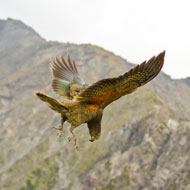
Play call encourages other parrots to play
New research has found kea parrots have a ‘play call’ that prompts other birds to play, making them the first non-mammal to demonstrate ‘emotionally contagious’ sounds.
Groups of wild kea were shown to play more and for longer periods after hearing recordings of play calls, compared to those that were played recordings of other vocalisations.
Whilst it may be anthropomorphic, researchers said the kea play call could be compared to a form of infectious laughter in humans.
Raoul Schwing of the Messerli Research Institute in Austria explained: “The fact that at least some of these birds started playing spontaneously when no other birds had been playing suggests that, similar to human laughter, it had an emotional effect on the birds that heard it, putting them in a playful state.”
Writing in Current Biology, researchers said upon hearing the play call, many of the birds did not join in play that was already underway, but instead started playing with other non-playing birds, with objects or through aerial acrobatics.
‘These instances suggest that kea weren’t ‘invited’ to play, but this specific call induced playfulness, supporting the hypothesis that play vocalisations can act as a positive emotional contagion,’ they wrote.
The team are now planning to look at the general effects of play and calls on kea social groups.
Image © Raoul Schwing/Vetmeduni Vienna



 The BSAVA has opened submissions for the BSAVA Clinical Research Abstracts 2026.
The BSAVA has opened submissions for the BSAVA Clinical Research Abstracts 2026.